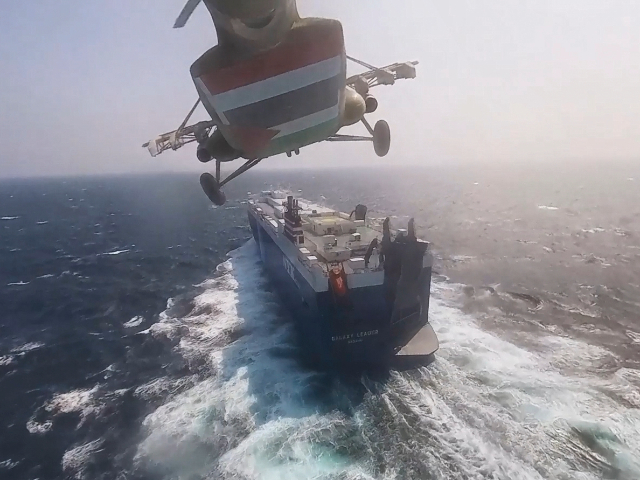Abdel-Malek al-Houthi, leader of the Iran-backed Houthi insurgents of Yemen, said on Wednesday his forces would attack U.S. warships in the Red Sea if Operation Prosperity Guardian uses military force against the Houthis.
“We will not stand idly by if the Americans are tempted to escalate further and commit foolishness by targeting our country or waging war against it,” the terrorist leader railed in a speech televised by Houthi media.
“Any American targeting of our country will be targeted by us, and we will make American battleships, interests, and navigation a target for our missiles, drones, and military operations,” he said.
“As long as the Americans want to enter into a direct war with us, they should know that we are not those who fear them and that they are facing an entire people,” he warned.
Al-Houthi said that if the Americans attack the part of Yemen his organization controls, they will “face something harsher than what they faced in Afghanistan and what they suffered in Vietnam.”
The Houthis may have already attacked American and allied warships in the Red Sea with drones, although U.S. officials have been reluctant to publicly confirm that the military vessels were the designated targets of the drone swarms launched from Yemen.
Houthi unmanned aerial vehicles (UAV) have not fared well in those engagements so far. All of the drones that approached American, French, or British warships have been intercepted and destroyed. In an especially vigorous encounter earlier in December, the Arleigh Burke-class U.S. Navy destroyer USS Carney took out a swarm of 14 Houthi drones.
For obvious reasons, allied defense officials will not discuss exactly how the Houthi drones have been intercepted, but some combination of electronic warfare, surface-to-air missiles, and naval guns has been highly effective.
Even the most capable allied ships and crews are struggling to provide security for the massive amount of shipping that passes through the Red Sea and Bab el-Mandeb Strait, and the Houthis are much better at attacking ships that cannot fight back. Their attacks have mostly involved anti-ship missiles and cheap suicide drones, although they used a helicopter-borne commando team to hijack a cargo ship in late November.

A Houthi forces helicopter approaches the cargo ship Galaxy Leader on November 19, 2023. (Houthi Media Center via AP)
U.S. Secretary of Defense Lloyd Austin announced on Monday the formation of a ten-member Red Sea security coalition dubbed Operation Prosperity Guardian. The Houthis said they were not intimidated by this announcement and would continue attacking commercial vessels until Israel halts its counter-terrorism operation against Hamas in Gaza.
The Houthis are members of a jihadi movement that calls itself “Ansar Allah,” the Army of Allah. Its slogan is “Allahu Akbar, Death to the United States, Death to Israel, Curse the Jews, Victory for Islam.” President Joe Biden lifted Ansar Allah’s classification as a terrorist organization in February 2021.
Houthi (and Iranian) media refer to Ansar Allah as the legitimate government of the part of Yemen it controls, but it has no legitimacy or international credibility; it rules purely by force and terror. Ansar Allah deposed the internationally recognized government of Yemen by conquering the capital city of Sanaa in 2014, touching off a brutal civil war that turned Yemen into one of the worst humanitarian catastrophes on Earth.
A coalition of Gulf states led by Saudi Arabia intervened in the Yemeni civil war in 2015, unsuccessfully attempting to dislodge the Houthi insurgents. The Houthis have used drones and missiles to attack civilian targets in Saudi Arabia and the United Arab Emirates (UAE) in retaliation for this intervention.
Biden ostensibly delisted the Houthis as terrorists to appease them and their patrons in Iran so humanitarian aid could be delivered to the sick and starving people of Yemen. The Biden State Department admitted in March 2021 that the Houthis blocked humanitarian shipments anyway. Ansar Allah has committed numerous other human rights violations, including the use of child soldiers.

COMMENTS
Please let us know if you're having issues with commenting.